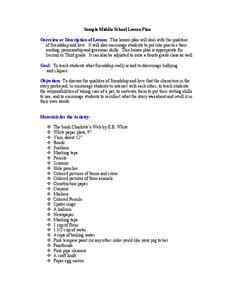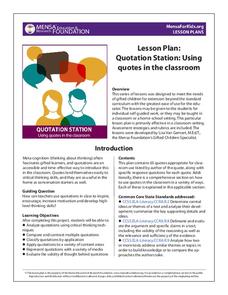ESL Kid Stuff
Intro ESL Lesson (Ages 3-7)
If you are working on colors, printing names, introductions, and other projects in the first few weeks of school, use a series of activities designed for English language learners. It includes cute ways to wish your little ones hello and...
Scholastic
Smart Quotes Mini-Lesson
Prepare for an interview project with a set of worksheets about asking questions and quoting people. After completing a grammar exercise about quotation marks, kids write out the questions they want to ask their interviewee, and record...
Lied Center of Kansas
The Ugly Duckling and The Tortoise and the Hare
Both The Ugly Duckling and The Tortoise and the Hare are great additions to an elementary language arts lesson. Young readers focus on the literary elements of each story, including characters and plot development, and apply counting and...
All for KIDZ
Building Relationships: The Orphan of Ellis Island
Family and friendship are two very important themes of the historical fiction novel The Orphan of Ellis Island by Elvira Woodruff. From video clips and writing prompts to reader's theater and family interviews, this resource provides...
Kelly's Kindergarten
March Daily Activities
There's a pot of gold at the end of the school year! Use a month's worth of reading, writing, and counting activities to keep kids learning through the month of March.
ReadWriteThink
Literature Circles: Getting Started
Make reading more enjoyable and interactive with literature circles! Here you'll find detailed lessons to begin the literature circle process. Ten lessons introduce each role learners take on. Literature circle roles include...
Apple State University
Friendly Letter Mini-Lesson
This mini-lesson plan about informal letter writing is packed with a lot of information about writing a friendly letter. Class members begin by working in pairs to answer questions after reviewing letter models. Then, take part in a...
Quia
Charlotte’s Web Lesson Plan
Make your classroom into a place of kindness and compassion with E.B White's Charlotte's Web. The first four pages of the lesson plan guide you through several steps and projects, including discussions on Charlotte and Wilbur's...
Berkshire Museum
Adopt a Schoolyard Tree
Help young scientists connect with nature and learn about trees with a fun life science lesson plan. Heading out into the school yard, children choose a tree to adopt, taking measurements, writing descriptions, and drawing sketches of it...
Read Write Think
Poetry Portfolios: Using Poetry to Teach Reading
Over the course of five periods, scholars create a poetry portfolio. They begin with a reading of the poem, Firefly. With a focus on vocabulary, learners reread the poem then look for sight words and other skills.
MENSA Education & Research Foundation
Quotation Station: Using Quotes in the Classroom
An informative list compiled with quotes, authors, and discussion questions, along with 20 out-of-the-box application ideas, make up the collection of lessons geared to spark dialogue and creative thinking about quotations.
National Museum of the American Indian
To Honor & Comfort Native Quilting Traditions
"Native American history leaps boldly off the colorful quilts and patchwork designs." Learners discuss Native American identity and symbolism by reading about a variety of Native quilters and their unique art process, and participate in...
Project SMART
Rocks and Minerals: Touch the Earth
Students complete a unit of lessons on rocks and minerals. They conduct research, write e-mail questions to geologists, write daily journal entries, label maps demonstrating types of rocks/minerals found, and create a web page that...














